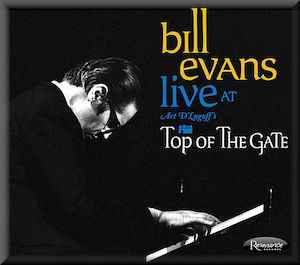Set 1:
1. Emily 4:46
2. Witchcraft 5:44
3. Yesterdays 5:07
4. Round Midnight 6:25
5. My Funny Valentine 4:44
6. California Here I Come 5:43
7. Gone With the Wind 6:55
8. Alfie 5:08
9. Turn Out the Stars 4:37
Set 2:
1. Yesterdays 4:48
2. Emily (Alternate Version) 5:08
3. In a Sentimental Mood 4:06
4. Round Midnight (Alternate Version) 6:26
5. Autumn Leaves 5:30
6. Someday My Prince Will Come 5:13
7. Mother of Earl 4:21
8. Here's That Rainy Day 5:15
Bill Evans (piano), Eddie Gomez (bass), Marty Morell (drums).
rec. Top of the Gate, Greenwich Village, NYC, 23 October 1968. [90:00]
I've been a huge fan of Bill Evans for about twenty years or so. I regret that I had never discovered his music when I was growing up in New York, where I could have heard him live in the late 1970s. That said, the many recordings - notably numerous live issues - allow me to appreciate his music and his skills as an improviser.
From the very first recording Evans released, from the Village Vanguard in 1961, through the final one made in the year of his death in 1980, listeners can hear many examples of Evans' live performances with his trios.
This newly "discovered" recording was made at Top of the Gate, the room above the Village Gate, in Greenwich Village in New York City. For these two sets, Evans was recorded by George Klabin, a recording engineer for WKCR-FM, the Columbia University radio station. Klabin had an interesting recording strategy for the time. Instead of a single stereo microphone placed somewhere in front of the musicians, he used three mikes, one for each musician. He then mixed this down to stereo live, positioning the piano in the center, the drums to the left, and the bass to the right. The result is a surprisingly well-defined recording, in spite of the somewhat artificial positioning of the instruments. A photo on the cover of the booklet shows the piano to the left, the bass in the center, and the drums on the right, which is often the way piano trios perform. However, the sound is a bit muffled, particularly on the first two tracks. Klabin didn't have any sound check, and adjusted the sound as the performance went on.
The recording lets through crowd noise, and, as on the 1961 Village Vanguard recordings, and on some other live Bill Evans volumes, this provides a realistic atmosphere. Though I shudder to think of all those people talking and not listening to such a great musician.
As for the performances themselves, these are a mixed bag. In some tracks, Evans sounds like he's in a hurry: Yesterdays or Autumn Leaves on disc 2. On others he is more lyrical: Someday My Prince Will Come, California Here I Come, Alfie. One highlight is the version of Round Midnight on disc 1 - he plays it once in each set - where Evans deconstructs the song. Overall, this is a decent night of music, but I don't feel it deserves the superlatives that this set has garnered in some quarters. All of the songs, with the exception of Turn Out the Stars, which closes the first set, are standards, and there are two songs that were played here for the first time: My Funny Valentine and Here's That Rainy Day.
I'm not a big fan of Eddie Gomez, the bass player here. He often seems to be playing a totally different tune than the other musicians, going off into seemingly aimless noodling. This can be heard here at times. Drummer Marty Morell, who had only recently joined Evans' trio - this is the earliest recording with Morell - is a straightforward jazz drummer who has no need to show off. He provides a solid backing without ever exaggerating.
This is a mixed bag. The recording quality is good, and the separation of the instruments very interesting. The results are often very good, but don't reach the sublime level achieved by the 1961 Village Vanguard tracks. Fans and completists will certainly want this set, but for others just discovering Bill Evans, both the performances and sound on the 1961 Village Vanguard recordings, and on many other live recordings, are far superior. One classic example is Bill Evans At The Montreux Jazz Festival which was recorded just a few months before this set.
Kirk McElhearn
Kirk McElhearn writes about more than just music on his blog Kirkville (http://www.mcelhearn.com).
